French supermarkets combat food waste through strategies and collaborations. Legal regulations guide their efforts to reduce waste, while partnerships with nonprofits and food banks aid in redistributing surplus food. Despite making progress, challenges persist in efficiently minimizing waste throughout the supply chain.
This article will look at how French supermarkets are dealing with food waste, the strategies they are using, and the impact their work is having. It will also explore some of the challenges that still remain in this fight against food waste.
Food Waste in French Supermarkets
Food waste in French supermarkets is a pressing issue that requires urgent attention. With approximately 10 million tonnes of food wasted annually, these establishments play a significant role in addressing the problem. Despite the implementation of legal regulations and strategies such as mandatory food donations and inventory management systems, challenges persist in effectively minimizing waste.
Collaborations with nonprofits and food banks help redistribute surplus food, but efforts to maintain the quality of donated items and manage inventory throughout the supply chain remain essential. Continued commitment and innovation are necessary to combat food waste and foster a more sustainable approach to food consumption in French supermarkets.
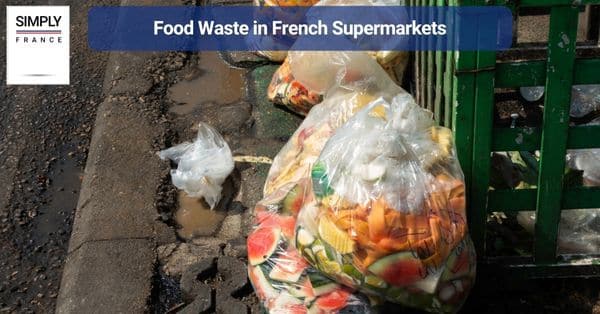
Legal Regulations in France
In an effort to combat food waste and help those in need, France has implemented strict legal regulations on supermarkets. These regulations have a significant impact on how supermarkets operate, ensuring that food is not wasted and that it reaches those who need it most. Here, we’ll take a closer look at these legal regulations and their effects on supermarkets in France.

The Law Against Food Waste
In 2016, France became the first country in the world to pass a law that prohibits supermarkets from throwing away unsold food. According to this law, supermarkets with a footprint of 400 square meters or more are required to sign agreements with charities or food banks.
These agreements ensure that unsold food is donated to those in need, rather than being discarded. Supermarkets that fail to comply with these regulations face hefty fines, which can be as high as €75,000 ($83,000) or two years imprisonment.
Reducing Waste Through Redistribution
The main goal of these legal regulations is to reduce food waste by redistributing unsold food items to charities and food banks. This not only helps to minimize the environmental impact of food waste but also provides much-needed assistance to those who are struggling with food insecurity.
By forging partnerships with local charitable organizations, supermarkets are able to redirect their unsold food items to those who need them most. This collaborative effort ensures that perfectly edible food does not go to waste, and instead goes to individuals and families who might otherwise go hungry.
Encouraging Sustainable Practices
Beyond simply preventing food waste, these legal regulations also encourage supermarkets to adopt more sustainable practices. Many supermarkets have taken steps to reduce food waste at the source, such as improving their inventory management systems and implementing more efficient ordering processes.
Additionally, some supermarkets have begun to offer discounts on products nearing their expiration dates, incentivizing customers to purchase these items and preventing them from going to waste.
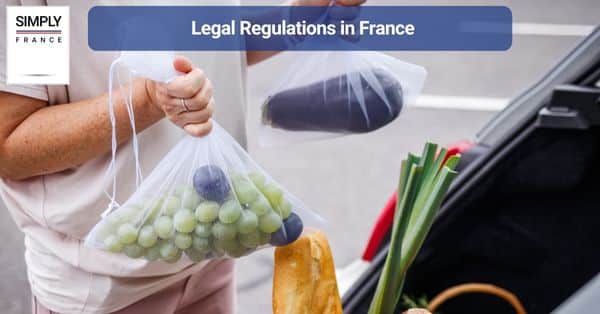
Supermarket Strategies to Reduce Waste
A recent law in France has banned supermarkets from throwing away food that is still edible. While this is a step in the right direction towards reducing food waste, there are other strategies that supermarkets can implement to further reduce their waste. By doing so, they can not only benefit the environment but also save money. In this article, we will look at some supermarket strategies to reduce waste.
1. Improve inventory management– Supermarkets can reduce waste by improving their inventory management. This involves keeping track of the products that are selling well and those that are not. They can then order fewer of the products that are not selling well to avoid them going to waste.
2. Implement a “reduced shelf” section– Supermarkets can create a “reduced shelf” section where products that are approaching their best-before date can be sold at a reduced price. This not only reduces waste but also provides customers with discounted prices.
3. Donate to charities-Supermarkets can donate food that is still edible to charities and food banks. This can help feed people who are in need while also reducing waste.
4. Educate customers– Supermarkets can educate their customers on the importance of reducing waste. This can be done through posters, leaflets, or even workshops. By raising awareness, customers may be more mindful about the amount of food they purchase and waste.
5. Partner with local farms– Supermarkets can partner with local farms to sell produce that is in season and locally grown. By doing so, they can reduce the amount of produce that is transported long distances, which can result in spoilage and waste.
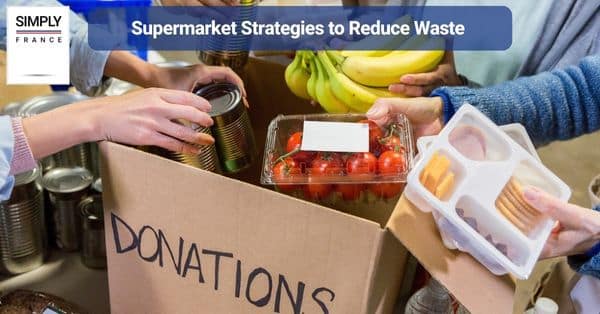
Collaboration with Nonprofits and Food Banks
Food waste is a global issue that affects millions of people worldwide. In France, supermarkets are taking a stand against this problem by partnering with nonprofits and food banks to ensure that no food goes to waste. This collaboration has led to the implementation of laws that prevent supermarkets from throwing away edible food, and instead, donating it to those in need.
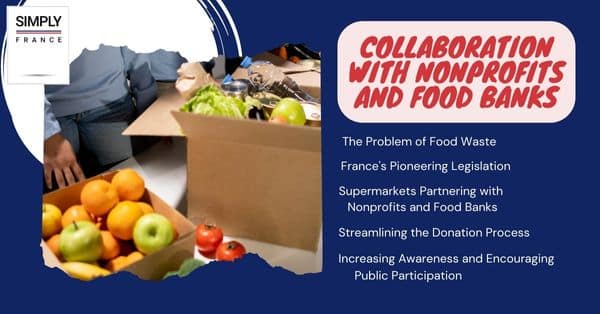
The Problem of Food Waste
Every year, millions of tonnes of food are wasted worldwide. This waste not only contributes to environmental issues like greenhouse gas emissions, but it also means that countless individuals go hungry when there could be food available for them. In France alone, it is estimated that around 10 million tons of food are wasted annually.
France’s Pioneering Legislation
In 2016, France became the first country in the world to pass a law that bans supermarkets from throwing away or destroying unsold food. Instead, they are required to donate it to charities and food banks. This groundbreaking legislation has set an example for other countries to follow and adopt similar measures to combat food waste.
Supermarkets Partnering with Nonprofits and Food Banks
To comply with the new law, supermarkets in France have established partnerships with nonprofits and food banks. These organizations collect the unsold food and distribute it to those in need. By doing so, they help reduce food waste and provide much-needed sustenance to people who might otherwise go hungry.
Streamlining the Donation Process
Collaboration between supermarkets, nonprofits, and food banks has led to the development of efficient processes for collecting and distributing unsold food. This includes establishing clear communication channels, setting up regular collection schedules, and ensuring proper storage and transportation of the donated food.
Increasing Awareness and Encouraging Public Participation
The partnerships between supermarkets and nonprofits have also helped raise awareness about the issue of food waste. Many supermarkets now display information about food bank initiatives in their stores, encouraging customers to get involved and support the cause. This increased awareness has led to a greater understanding of the importance of reducing food waste and has inspired more people to take action in their own lives.
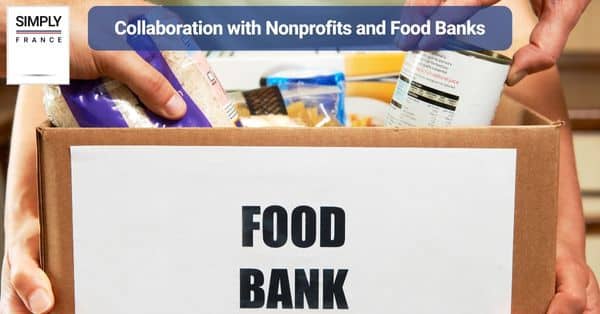
Impact and Challenges of Waste Reduction
Efforts to reduce waste have a significant impact on promoting sustainability and combating the global issue of food waste. While progress has been made in waste reduction initiatives, various challenges persist that need to be addressed for a more effective and widespread impact.
Environmental Impact
- Reduction in greenhouse gas emissions associated with decomposing food waste.
- Conservation of natural resources like water and land used in food production.
- Mitigation of negative ecological effects caused by landfill waste.
Social Impact
- Increased availability of surplus food for redistribution to those in need.
- Alleviation of food insecurity and hunger through partnerships with nonprofits and food banks.
- Improved social equity by reducing disparities in access to food.
Economic Impact
- Cost savings for households, businesses, and governments through waste reduction.
- Creation of new job opportunities in waste management and recycling sectors.
- Enhanced efficiency in the food supply chain, leading to reduced production and transportation costs.
Challenges in Waste Reduction
- Consumer behavior and perception regarding imperfect or expired food items.
- Logistics and infrastructure limitations in collecting, storing, and redistributing surplus food.
- Proper implementation and compliance with waste reduction regulations and policies.
- Education and awareness campaigns to encourage sustainable consumption practices.
Innovation and Future Solutions
- Technological advancements for better food storage, preservation, and tracking.
- Collaboration among stakeholders to develop innovative waste reduction strategies.
- Research and development of sustainable packaging materials and practices.
- Integration of waste reduction practices into the design of food production and distribution systems.
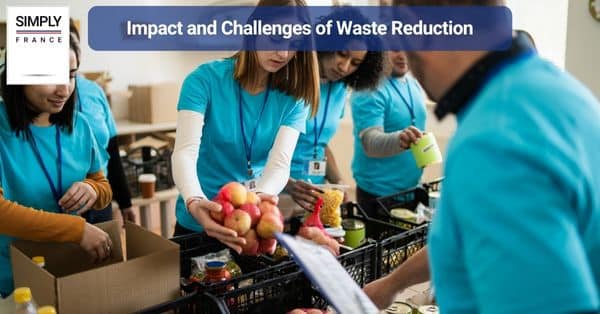
In conclusion
French supermarkets are making progress in reducing food waste through legal regulations, partnerships with nonprofits and food banks, strategies such as inventory management, and initiatives to encourage sustainable practices. While these efforts have had a positive impact on the environment and social well-being, challenges remain in effectively minimizing waste throughout the supply chain.
To further reduce food waste, innovation, and collaboration are essential to develop more effective solutions and foster a culture of sustainable consumption. Only by working together can we create a more sustainable future and ensure that no food goes to waste.


